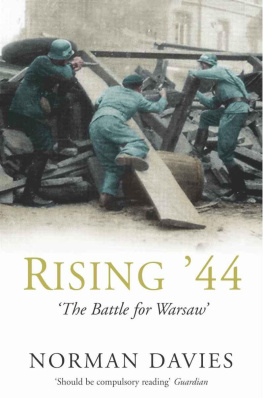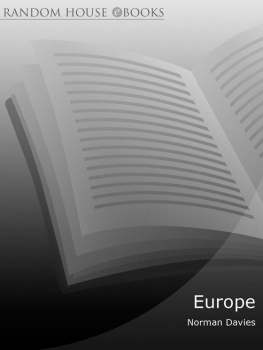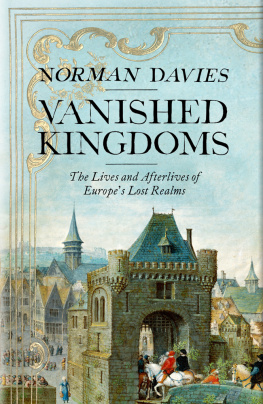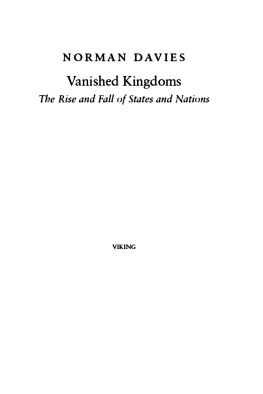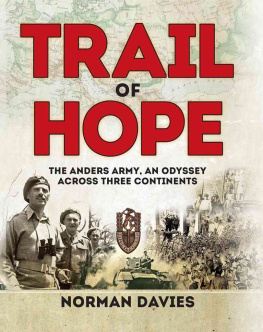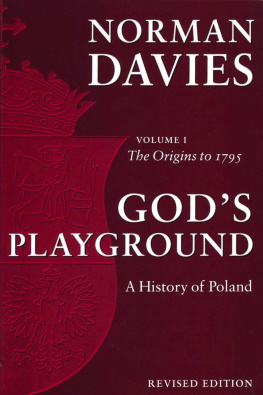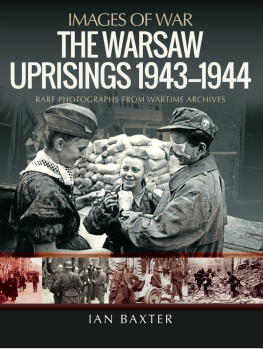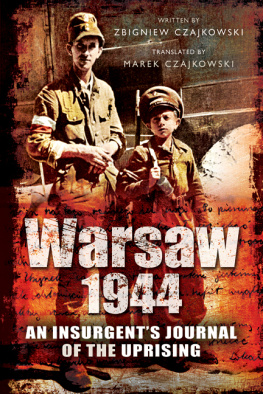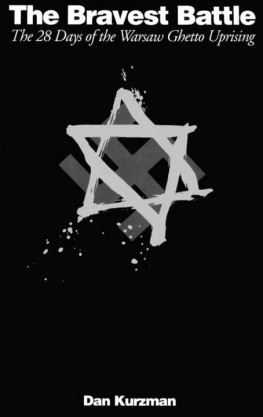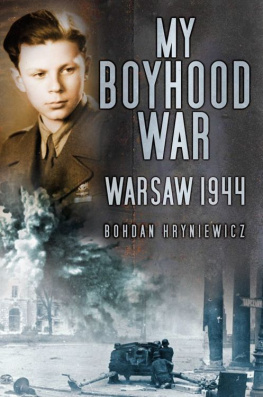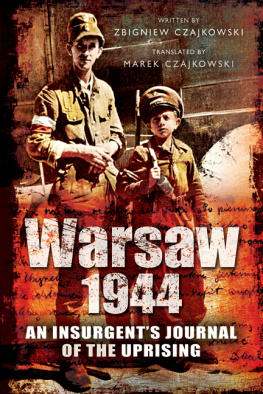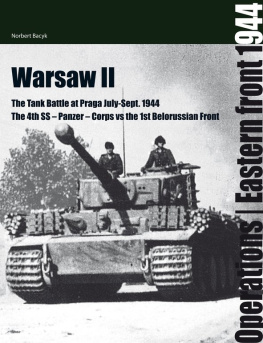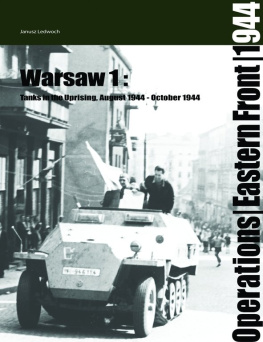RISING 44
It is an extraordinary story, and it is fairly and honestly told here. Davies is an intelligent and balanced guide through its intricacies, and he is always entertaining... Its real merit is that it lifts the question of the Warsaw Rising out of the parochial Polish conundrum of whether it was justified or not and places it firmly at the centre of Allied policy and planning, where it belongs... As one delves deeper into it, one comes to realise that this powerful book is not so much about the Warsaw uprising as about the defeat of liberal democracy in the Second World War
Adam Zamoyski, Spectator
As veterans and heads of the wartime alliance commemorate the D-Day landings, Poles will remember, at sombre ceremonies in Warsaw, those same allies betrayal of their heroic role in the liberation of Europe. Despite the efforts of Whitehall and Washington at the time to portray the Poles uprising against the Nazis as a romantic gesture, it has long been accepted that Stalin was the real villain of the piece. The Russians rapid advance to the outskirts of Warsaw had unaccountably stalled. They remained passive while the rising ran its bloody course. So much for the traditional version. Now Norman Davies has delved into newly opened western and Polish archives to reveal a scenario that shames the western alliance leadership. [A] passionate and impressive indictment
John Crossland, Sunday Times
To this day, most foreign visitors to Warsaw mix up the Warsaw uprising of 1944 with the Warsaw Ghetto uprising of 1943. But even in Poland, the uprising became part of underground history, or rather legend... it is particularly compelling to Norman Davies, who has long been obsessed with the forgotten history of Poland and eastern Europe... Davies is at his best when he focuses on issues such as everyday life during the uprising and the terrible deprivations of life in a city that was slowly being turned to rubble
Anne Applebaum, Evening Standard
Davies book offers readers the rare experience of discovering a forgotten, controversial chapter of history. The breadth of his writing is conveyed in attention to detail and a descriptive chronicle of events, including battles. As a person whose interest goes beyond exploring the historical events, who seeks to create a kind of memorial to the forgotten heroes, Davies weaves in memoirs, diary entries, letters, even philosophical passages and poetry, which diversify the reading and learning experience... Davies book is a profound and meaningful contribution to an old historical debate, possibly signalling a new and fascinating direction in the study of World War II and the roots of the Cold War
Eli Shaltiel, Haaretz
Norman Daviess masterful account of the Battle for Warsaw... is a work of superlative narrative history, and, moreover, commendably honest... Rising 44 has the feel of an authoritative study and provides an exceptionally detailed picture of guerrilla combat in the Polish capital... an important book, which raises awkward questions about the Allies cynical acquiescence in a totalitarian ideology
Ian Thomson, Irish Times
This well-argued book is the first in any language to put the Warsaw Rising in its full historical context. In its range and depth it is a fine contribution not just to Polish history but to the history of Europe
Stefan Wagstyl, Financial Times
Norman Davies is the bestselling author of Europe: A History and The Isles: A History. He is also the author of the definitive history of Poland, Gods Playground , and several books on European history. Born in Bolton, Lancashire in 1939, Davies is a graduate of Magdalen College, Oxford and the University of Sussex. He is a Supernumerary Fellow at Wolfson College, Oxford and is a Fellow of the British Academy, Fellow of the Royal Historical Society, and Professor Emeritus of London University.
Also by Norman Davies
and published by Pan Macmillan
THE ISLES
A History
NORMAN DAVIES
RISING 44
The Battle for Warsaw
PAN BOOKS

First published 2003 by Macmillan
This corrected and expanded edition published 2004 by Pan Books
This electronic edition published 2008 by Pan Books
an imprint of Pan Macmillan Ltd
Pan Macmillan, 20 New Wharf Rd, London N1 9RR
Basingstoke and Oxford
Associated companies throughout the world
www.panmacmillan.com
ISBN 978-0-330-47575-4 in Adobe Reader format
ISBN 978-0-330-47574-7 in Adobe Digital Editions format
ISBN 978-0-330-47576-1 in Mobipocket format
Copyright Norman Davies 2003, 2004
Map artwork by Martin Lubikowski
The right of Norman Davies to be identified as the author of this work has been asserted by him in accordance with the Copyright, Designs and Patents Act 1988.
Three cartoons by David Low copyright Atlantic Syndication.
AS I PLEASE by George Orwell (Copyright George Orwell, 1944) by permission of Bill Hamilton as the Literary Executor of the Estate of the Late Sonia Brownell Orwell and Secker & Warburg Ltd.
Compo di Fiori (16 lines) from THE COLLECTED POEMS 1931-1987 by Czeslaw Milosz (Viking, 1988)
Copyright Czeslaw Milosz 1988. Reproduced by permission of Penguin Books Ltd.
The cover of Poland by W.J. Rose (Penguin Books, 1939) Copyright W.J.Rose, 1939.
Every effort has been made to contact other copyright holders of material reproduced in this book. If any have been inadvertently overlooked, the publishers will be pleased to make restitution at the earliest opportunity.
You may not copy, store, distribute, transmit, reproduce or otherwise make available this publication (or any part of it) in any form, or by any means (electronic, digital, optical, mechanical, photocopying, recording or otherwise), without the prior written permission of the publisher. Any person who does any unauthorized act in relation to this publication may be liable to criminal prosecution and civil claims for damages.
A CIP catalogue record for this book is available from the British Library.
Visit www.panmacmillan.com to read more about all our books and to buy them. You will also find features, author interviews and news of any author events, and you can sign up for e-newsletters so that youre always first to hear about our new releases.
To WARSAW
And to all who
fight tyranny
regardless

Foreword
My aim in writing Rising 44 was nothing more complicated than to tell the story of one of the great tragedies of the twentieth century. It is a story that has never been properly told, even though it reveals some fundamental truths about the Second World War and challenges many conventional assumptions. For half a century and more, it was the subject of severe censorship by post-war authorities who did not wish to see the historical realities publicized; and, as a topic of acute embarrassment for the Western Powers, it has not been given prominence in Western interpretations. Although it resulted in the near-total destruction of one of Europes ancient capitals, and in enormous loss of life, it was never brought for examination before the Nuremberg Tribunal. Equally, since it was not seen as one of the critical turning points, on which the fortunes of the war depended, it has rarely attracted the close scrutiny of British or American historians. The historiography of the subject, in consequence, tends to be somewhat parochial.
Of course, many people are likely to have heard of a rising or of an uprising in Warsaw. They may have read books, watched films, or listened to survivors accounts. And they may well be under the impression that the event has been fully aired and discussed. If so, they will not have to explore very far to realize that much of the existing information in these matters is highly selective and misleading.

